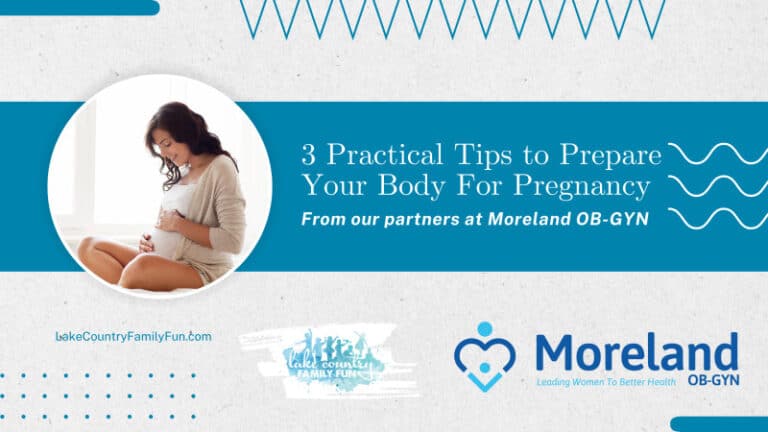Thank you to our partners at Moreland OB-GYN for sharing their wealth of knowledge with us so all families can get an amazing head start at life. Preparing your body for pregnancy is an important first step in ensuring mom and baby have a healthy pregnancy. All words below are their own.
3 Practical Tips to Prepare Your Body for Pregnancy
To start, there are a few basic things you should understand about conception. Your age, your state of health—in terms of exercise, weight and smoking, for example—and your family history, can all affect your fertility.
It’s important to understand that many couples don’t conceive right away. In fact, of all couples trying to conceive:
- 30 percent get pregnant within the first cycle (about one month)
- 60 percent get pregnant within three cycles (about three months)
- 85 percent get pregnant within twelve cycles (about twelve months)
At Moreland OB-GYN, we take pride in helping women understand pregnancy, from conception to birth. Below, our team of expert obstetricians shares three tips on how you can optimize your health and prepare your body for pregnancy. In addition, we offer some tried and true advice on fertility and minimally invasive options to help you get pregnant.
1. Feed Your Body Healthy Foods
Sounds easy enough, right!? Introducing or maintaining a healthy diet is a great first step to getting your body in peak condition for conception. Fueling your body with the right foods and maintaining a healthy weight will help regulate your hormones and strengthen your body for the amazing pregnancy journey ahead of you.
Foods you should add to your weekly menu as you plan for pregnancy:
Fish – If you don’t already include fish in your weekly meal plan, you should! Look for fish with plenty of omega-3s and little to no mercury. Even after conception, omega-3s are an important part of your diet because they help baby’s brain and eye development. Steer clear of fish with high levels of mercury such as shark, king mackerel, ahi tuna and marlin as they can cause more harm than good.
If fish is something you would rather avoid altogether, fish oil supplements are a good alternative to consider.
This US Food & Drug Administration chart is a great resource, giving you all the information you need to decide which fish to eat and avoid based on mercury levels.
Vitamin C – Adding more vitamin C is a great idea to help your body prepare for baby. It also helps the body absorb iron, which is vital for your developing baby and will help you keep your immune system healthy.
Folate – Also known as folic acid, folate is a B vitamin which helps the body build new cells, and can even help prevent birth defects.
Everyone’s body is different. So it is always a good idea to talk to your doctor about the top nutrition factors you should consider to give your body the proper balance as you prepare for pregnancy.
Looking for more helpful information? Download your pregnancy planning kit.
2. Reduce Stress and Get More Sleep
Research shows that stress does have a considerable effect on fertility. While you may be thinking that reducing stress levels is easier said than done, it is important to make relaxation a priority in your day. Whether you choose yoga, meditation or a nice relaxing bath, find simple ways to treat yourself and reduce stress. Spend time doing whatever it is that brings you bliss and put everything else on the back burner.
Sleep is another way to help boost relaxation and it can also help you regulate and balance your hormones. An inconsistent sleep cycle can disrupt ovulation, making it difficult to monitor the appropriate window of conception. Just remember that the average adult needs about 8 hours of sleep. If you aren’t reaching the ideal amount of sleep, consider making some adjustments to your bedtime routine – your mind and body will thank you.
Do you have pre-pregnancy questions? Get answers! Download your pregnancy planning kit, now.
3. Strengthen Your Body To Prepare Your Body For Baby
Speaking of sleep … exercise is a great way to improve sleep patterns and boost feel-good endorphins! Exercise releases serotonin, a chemical neurotransmitter that can stabilize your mood and make you feel good. Not to mention, it will help you build strength and stamina for when you have to carry the extra weight of a baby.
We typically tell our patients that adding in both cardio and light weights are a great option. You don’t need to do anything too strenuous and you don’t need to work out excessively. Try adding a brisk walk to your schedule a few times a week. If your body is used to working out regularly, continuing with your exercise should not negatively affect fertility.
Whatever exercise routine you choose, getting your heart rate up regularly helps your overall health and starting healthy habits now will help you bounce back after your delivery.
When You Should Call A Doctor
If you are having trouble with your menstrual cycles or conception, it is always a good idea to seek out the advice of a board certified obstetrician. If anything, meeting with a doctor can help put your mind at ease as you embark on your journey into motherhood.
If you are having trouble getting pregnant or are 35 years of age or older, you may be considered a high-risk pregnancy patient, but don’t let that worry you. Our team of trusted physicians are trained to manage advanced maternal aged (AMA) pregnancies, and we are here to help.
“If you have concerns about conception or fertility, talk to your doctor. I am always happy to talk through questions with my patients and help them understand the difficulties they may face as older, or higher risk patients. We can work together to make a plan that fits your needs so you feel prepared and positive about pregnancy and delivery.” – Allison M. Nelson, M.D.

The Best Baby Gear for Moms in 2025
Written by our friends at Moreland OB-GYN, information complied from hundreds of local moms.







